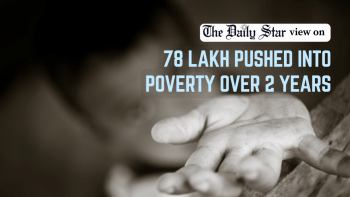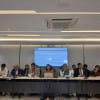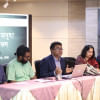Citizens, too, must step up to ensure our food security

My personal experience of living in both capitalist and socialist countries occasionally surfaces in my Marxist theory classes. In the former, I found the price of a gallon of milk teasingly close to that of a litre. To tempt consumers further, there were often "buy one, get one free" offers. Therefore, I would visit the supermarket for a litre of milk, only to return home with two gallons, each with a short expiration date. The challenge was to consume the extra purchase: the response ranged from preparing impromptu milk-based dishes, inviting guests, or discarding most of the excess milk. The surplus makes you buy more and more, changing both your culinary and social behaviours. Instead of being remorseful for the waste, you boast about the innovative ways you used the milk. In contrast, in a socialist country, the milk box size varied from 250 grams to one litre. If you need more for a party, buy several boxes according to your need. In the process, you become a responsible consumer.
Looking at some stats related to dairy cows, I discovered that the US is ranked seventh in terms of the population of cows, but it tops the list in terms of milk production. On the same list of cow populations, we are ranked 15th, but we don't even appear in the top milk-producing countries. We have one of the lowest per capita milk consumption rates among our neighbours. And it will take almost 10 years to be self-sufficient in milk production, according to a local research.
In the recently submitted White Paper on the State of the Bangladesh Economy, there is a chapter on food security. The report mentions that despite the country's significant progress, it still encounters major challenges in achieving nutritional goals. The 2023 Global Hunger Index classifies our food security as a "serious" hunger issue. There are still threats of "hidden hunger" plaguing the country. While rice production has increased fourfold in the last 50 years, "there are still production gaps for certain non-rice crops, including wheat, maize, pulses, oilseeds, and onions."
Currently, the interim government faces embarrassment due to its incapacity to regulate potato and onion prices. Incentives provided for rice production have yielded near self-sufficiency in Boro and Aman breeds. However, this does not apply to other products. Researchers have held the use of soil for rice responsible for the degradation of soil quality and zinc deficiency. The report makes some beneficial suggestions on food security.
As a non-expert, what concerns me is the sudden disappearance of a particular product from the market due to the potential price hike in the coming days. For instance, the cartel behind the market hoards onions and potatoes before Ramadan, believing that their profits will increase when our eating habits change during the month of self-control. After a day-long fast, we will long for fried items that require onions, potatoes and aubergines. Inabilities to control the market led many of our political leaders to propose alternative recipes, much to the chagrin of daily users. The import of potatoes from our neighbour, with whom we are engaged in a war of words, sprinkles salt dust over our wound of not being self-sufficient in food, even 53 years after independence.
The liberalisation of trade has changed the agricultural heart of our nation. We are fast becoming over-reliant on exports, seeking quick cash from industries like tourism and real estate. The new money class is privatising land for private resorts. Tourism is changing the ecosystem of our paddy fields and fisheries. Meanwhile, the lure of foreign investment in special economic zones (SEZs) has led to land consolidation for cash crops and industrial goods meant for affluent countries. The result? Food shortages and skyrocketing prices have left citizens vulnerable to crisis and unrest. The unchecked prioritisation of misguided development projects and economic liberalisation has endangered our most basic needs while benefiting the privileged few.
We need to let go of the idea that the government must do everything. Food security isn't just a government responsibility; it's a collective effort. We can make a difference by changing ourselves and our food choices. For instance, by diversifying our diets and embracing locally grown, seasonal foods, we can reduce our dependency on imports and support local farmers. By prioritising health over excess, we can contribute to food sustainability and reduce import dependency. We need to plan meals wisely and store foods properly to minimise waste. This way, we can reduce pressure on our food supply, even if just a little bit.
Land conversion for tourism complexes and luxury villas is both unreasonable and irresponsible. Citizens with access to land—even small plots—can grow kitchen vegetables like chillies, tomatoes, and leafy greens. Rooftops and balconies can transform into urban gardens with minimal efforts.
Our rivers and wetlands are a treasure trove of resources waiting to be revitalised. Supporting local fisheries and livestock farms can reduce our dependency on imported proteins. People can champion sustainable practices and encourage others to buy locally produced fish, dairy, and meat. Corruption in agricultural programmes often sidelines the most vulnerable farmers. We can demand greater transparency and accountability by joining community monitoring initiatives. Every voice counts in ensuring that resources reach the right hands.
National pride isn't just about cultural celebrations; it's about uplifting our farmers. Buy directly from local markets and support small-scale growers. Every purchase strengthens our agricultural backbone and helps build a resilient food system. Citizens must advocate for policies that prioritise agriculture over nonessential development. Let's push for infrastructure that benefits farmers, such as irrigation systems and storage facilities.
We need to incorporate agricultural knowledge and sustainable practices into school curricula. Teach children to grow their own vegetables and respect the work of farmers. A well-informed generation is our best bet for long-term food security.
Bangladesh's journey toward food security is a test of national character. By prioritising agriculture, revitalising traditional practices, and embracing local solutions, we can break free from the humiliation of being dependent. Let's stop sacrificing our fertile lands for fleeting gains and start building a future rooted in resilience and self-reliance. Together, we can ensure a food-secure Bangladesh worthy of its people and its legacy. Let's start planting the seeds of change today.
Dr Shamsad Mortuza is professor of English at Dhaka University.
Views expressed in this article are the author's own.
Follow The Daily Star Opinion on Facebook for the latest opinions, commentaries and analyses by experts and professionals. To contribute your article or letter to The Daily Star Opinion, see our guidelines for submission.

 For all latest news, follow The Daily Star's Google News channel.
For all latest news, follow The Daily Star's Google News channel. 









Comments